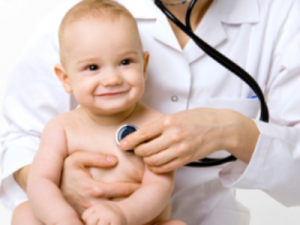What You Need to Know About Pediatric Heart Disease
 There are many forms of pediatric heart disease, and not all of them are rare. In fact, some kinds of heart disease could be as common as 1 in 100 children. This is why we want to identify and treat any symptoms of heart disease in your children as soon as we see them. The more parents know about pediatric heart disease, the faster we will be able to help your child. According to the American Heart Association, here are some of the different kinds of pediatric heart disease, and a little information on each:
There are many forms of pediatric heart disease, and not all of them are rare. In fact, some kinds of heart disease could be as common as 1 in 100 children. This is why we want to identify and treat any symptoms of heart disease in your children as soon as we see them. The more parents know about pediatric heart disease, the faster we will be able to help your child. According to the American Heart Association, here are some of the different kinds of pediatric heart disease, and a little information on each:
Arrhythmia
Arrhythmia refers to an irregular heartbeat. Typically, a child with an arrhythmia will have their heart rate increase when they inhale, then slow down when the exhale. While this condition is common, it can lead to other health concerns.
Cardiomyopathy
This condition refers to a diseased state of the heart involving abnormalities of the muscle fibers, which contract with each heartbeat. Cardiomyopathy is rare and can be problematic in two ways. The primary concern with this condition is that its muscle cells themselves can be abnormal, usually due to a gene mutation. It is a secondary problem when the muscle cells were normal but are affected by other diseases that have secondary damaging effects on the heart and its function such as certain infections, low blood flow to the heart, low blood oxygen or high blood pressure.
Cholesterol
Cholesterol problems can start in early childhood, continue into adulthood, and cause coronary heart disease. Atherosclerosis, or the buildup of fatty plaque in arteries, can begin in young people but can be prevented or treated by having your children regularly exercise, identifying high blood pressure, and discouraging cigarette smoking.
Congenital Heart Defects
This condition refers to the heart or blood vessels that don’t develop properly before birth. Some kinds of heart defects include Aortic Valve Stenosis (AVS), Atrial Septal Defect (ASD), Coarctation of the Aorta (CoA), Complete Atrioventricular Canal defect (CAVC), d-Transposition of the Great Arteries, Patent Ductus Arteriosus (PDA), or Pulmonary Atresia. All of these conditions can severely affect your child’s health.
Heart Failure
Heart failure can occur in any child whose heart does not function properly. It can be caused by overcirculation failure, in which oxygen-poor blood and oxygen-rich blood mix in the heart and don’t go to where they are needed, or pump failure, caused by virus infections to the heart. Some symptoms of heart failure in children are trouble breathing, poor feeding or growth, excessive sweating, or low blood pressure.
Stroke
Sometimes, children can have strokes due to a blood clot that could form in the heart then travel to the brain. Having sickle cell disease also is an indicator that your child could be at a higher risk for stroke. About 1 in 10 children with sickle cell disease have strokes. The effects of strokes in children include decreased field of vision and trouble with visual perception, loss of emotional control and changes in mood, cognitive changes or problems with memory, judgment and problem-solving, behavior changes or personality changes, and improper language or actions, among other things.
These are just a few of the common heart diseases in children. For more information visit the American Heart Association.
Dr. Chiuffo and the Minimally Invasive and Bloodless Heart Surgery Program
Dr. Chiuffo is dedicated to helping you and your child understand pediatric heart disease. If you have any questions about pediatric heart disease or treatments for your child, feel free to contact us at (330) 588-4676 or visit our contact page online.

